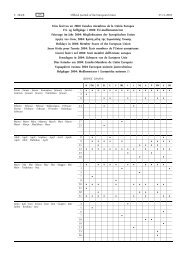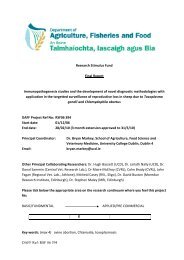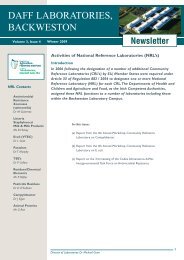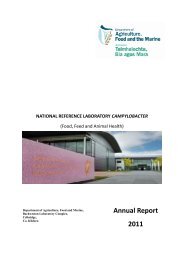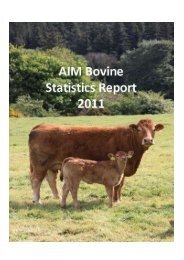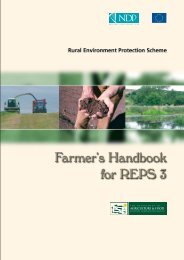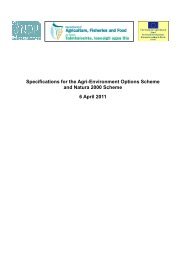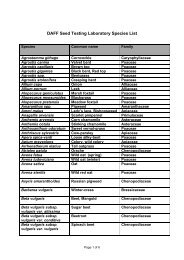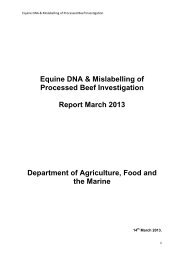Food Research Ireland - Department of Agriculture
Food Research Ireland - Department of Agriculture
Food Research Ireland - Department of Agriculture
You also want an ePaper? Increase the reach of your titles
YUMPU automatically turns print PDFs into web optimized ePapers that Google loves.
Using advanced proteomics techniques, researchers have developed a<br />
more fundamental understanding <strong>of</strong> many aspects <strong>of</strong> milk proteins. A<br />
rapid and cost effective method to assess the relative bioavailability <strong>of</strong><br />
vitamins has been developed, e.g. α–tocopherol (vit E) and retinol (vit<br />
A) in meat, dairy products and fortified fruit juice.<br />
<strong>Research</strong>ers with expertise in mining milk for bioactive ingredients are<br />
working with marine biological scientists to identify bioactive ingredients<br />
from seaweeds, micro-algae, fish – including, shellfish and from fish<br />
processing waste streams. Particular expertise exists in identifying<br />
peptides, enzymes, polymers, lipids and protein hydrolysates and<br />
materials possessing anti-oxidant, probiotic and prebiotic properties<br />
from marine species.<br />
Microcapsules (microgels) from marine polysaccharides, e.g. seaweed<br />
and alginates which are used to encapsulate materials such as food<br />
ingredients and are designed to release their contents at a certain<br />
destination either within the food product or human body where the<br />
beneficial effects can be realized have been developed. When added to<br />
foods the microgels do not affect their quality or texture and act as<br />
vehicles to enhance their flavour and nutritional properties.<br />
<strong>Research</strong> on extracellular polysaccharide (EPS) and its association with<br />
lactic acid bacteria with a view to establishing their functionality in dairy<br />
and cereal-based products is ongoing.<br />
Beverage technological development supports two distinct sectors i.e.<br />
alcoholic and non-alcoholic beverages. Irish scientists are uniquely<br />
positioned through years <strong>of</strong> research to help beverage companies<br />
(alcoholic and non-alcoholic) improve the efficiency <strong>of</strong> production<br />
processes, characterise existing products and/or develop new beverages<br />
based on novel concepts or added functional ingredients. They have<br />
considerable expertise in brewing & malting technology, beverage<br />
formulation, process technology and product development.<br />
<strong>Research</strong> expertise is available in brewing beer with yeast that produces<br />
an anti-microbial peptide (AMP) to kill beer-spoiling microbes, a<br />
technology aimed at helping to improve the shelf life <strong>of</strong> beer and<br />
innovative ways <strong>of</strong> eliminating beer spoilage, caused by beer spoiling<br />
microbes is being investigated. Human defensins that can kill beer<br />
spoiling microbes without affecting the yeast that ferments the beer<br />
have been identified. This technology will be a step towards improving<br />
the shelf-life <strong>of</strong> beer.<br />
In the area <strong>of</strong> meat, technologies for improved efficiencies and enhanced<br />
product quality, e.g. Tenderbound (hot boning and PiVac), electrical<br />
stimulation etc. have been developed and researchers are also working<br />
on methods to investigate the structural, biochemical and molecular<br />
basis for variation in quality. A patent has been filed which identifies the<br />
organisms that cause blown pack spoilage (major cause <strong>of</strong> loss); this test<br />
is currently being supplied as a service to industry. Work has been<br />
completed on DNA markers for meat quality traits, use <strong>of</strong> genetics to<br />
predict meat quality and the interaction <strong>of</strong> gene expression, breed and<br />
diet on the nutritive and flavour aspects <strong>of</strong> meat. <strong>Research</strong> is also<br />
ongoing to examine and explain the effects <strong>of</strong> ingredient addition and<br />
processing interventions on meat product structure and function. The<br />
functional peptides in beef, <strong>of</strong>fal and fermented beef products are being<br />
investigated and this research could add value to these meats.<br />
The application <strong>of</strong> high voltage pulsed electric fields (PEF) and high<br />
intensity ultrasound (US) to beef and ham products to assess if they can<br />
speed up tenderisation and curing is being investigated. Work has<br />
recently been completed in the area <strong>of</strong> electroheat applications for meat<br />
processing and radio frequency heating. Isotopes are being used to<br />
predict the geographical origin <strong>of</strong> meat, its rearing system and the diet<br />
history <strong>of</strong> animals. So far data is showing that stable isotope ratio analysis<br />
is a powerful tool in meat authentication. The health benefits <strong>of</strong> high CLA<br />
beef are being investigated. <strong>Research</strong> expertise also exists in computer<br />
vision systems based on image analysis which could be used as a rapid,<br />
<strong>Food</strong> <strong>Research</strong> <strong>Ireland</strong><br />
▼<br />
58<br />
2




